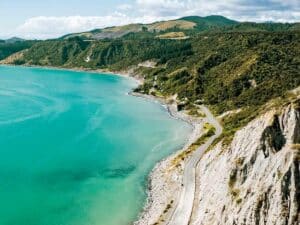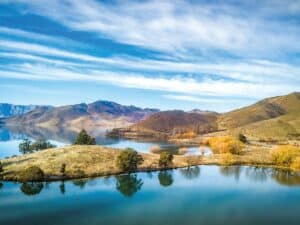Earlier this year, hubby and I managed to wrest our youngest teen off the Wi-Fi and head out of Auckland for a few days. Our good friends at RV Super Centre sorted us out with a four-berth Kea Breeze and the three of us travelled down to the Waikato to check out a destination I’ve wanted to visit for a good many years—the Waitomo Glowworm Caves.
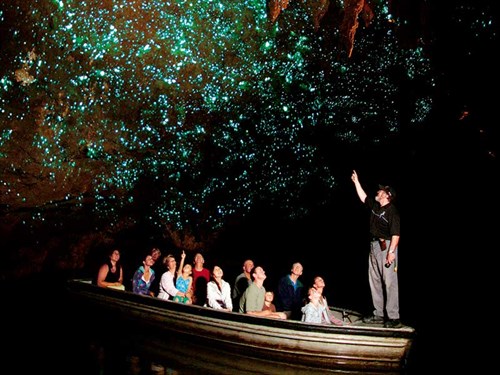
Using the Campable app, we found a great spot to stay just out of Tirau at the Okoroire Hot Springs Hotel campsite. At $25 per night, it offers everything needed for a comfortable few nights, including powered motorhome sites, bathroom and kitchen facilities, and a restaurant next door at the hotel if you don’t fancy cooking.
But best of all, they have hot springs. And they are good! The three natural thermal pools proved the perfect antidote after a long day of walking and exploring, and on a clear night, the stars above are spectacular. You forget how many there are when you live in the light-polluted city.
A quick tip, though—don’t risk arriving after dark like we did (motorhoming 101, of course!). Getting your motorhome stuck in the muddy bits and having to sheepishly ask for help getting unstuck wasn’t a great start (and consequently involved spending a good part of the next day washing off mud).
Heading down Waitomo Caves
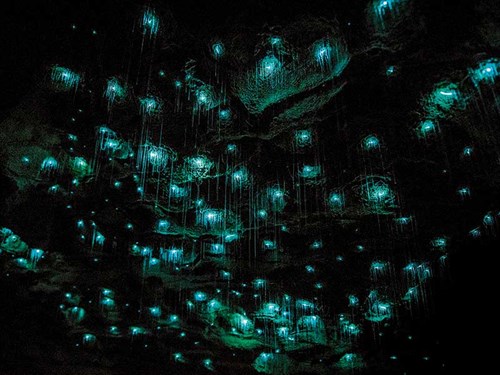
The Waitomo Caves lie about an hour south of Hamilton on Waitomo Village Road. There’s parking for motorhomes, and we were lucky enough to find the perfect spot under a shady tree.
The Glowworm Caves are steeped in New Zealand history having first been explored in 1887 by local Maori Chief, Tane Tinorau, and English surveyor, Fred Mace. Although locals knew of the caves, they’d never explored them until Tane and Fred headed underground. And what a discovery they made—a glowworm grotto illuminated by the tiny bright lights of thousands of glowworms.
Stepping into the caves is a little like going back in time. And little wonder, given they were formed more than 30 million years ago. Ancient stalactites hang from slabs of sparkling limestone, inching their way down to stalagmite counterparts at the virtually standstill rate of around 10cm every thousand years.
Safety first
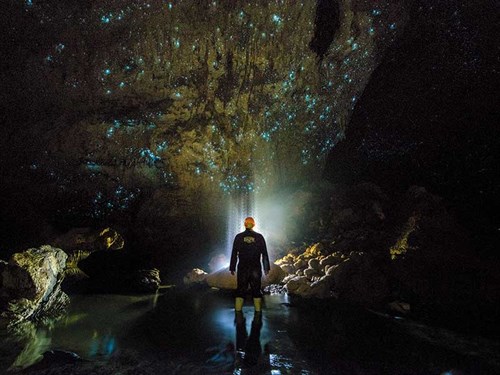
The caves were bustling with tourists on the day we visited, and I must admit I felt an unexpected sense of claustrophobia the minute I entered the cave. With huge pointy rocks hanging overhead, I started to wonder what the result might be if an earthquake struck, as they occasionally do in these parts. My mind was put at rest though when our tour guide reassured the group that the caves were completely safe. Even during the recent earthquakes that rocked the region, the caves’ precise monitors remained unmoved.
Carl Fischer, Waitomo’s environmental officer, explains that geologists believe the effects of earthquakes are less in caves than on the surface. “The seismic waves that would have the most potential to cause damage to caves (S waves) actually do very little because they are unable to travel through the air (or water) in the cave,” he says.
“The force arrives at the cave wall, displaces the air, and is absorbed with relatively little effect. In some instances, caves could be safer than above ground during an earthquake.”
Phew, good to know!
The Cathedral
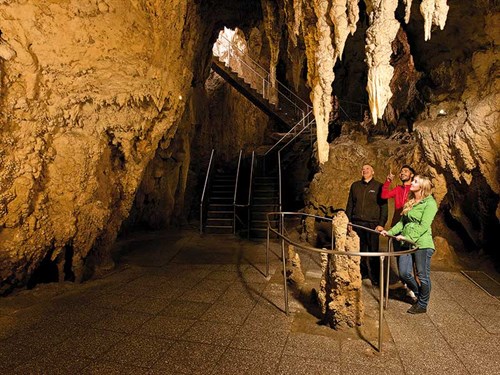
The first part of the cave, known as The Cathedral, is an awe-inspiring cavern world-renowned for its purity of acoustics, attracting many famous singers including Dame Kiri Te Kanawa to perform there.
From here, we headed down to board the boat ride that would take us through the Glowworm Grotto. Unfortunately, due to recent flooding, our boat trip was restricted to a shortened version, but we were still able to enjoy the breathtaking marvel of thousands upon thousands of white-blue lights shining like stars against the total blackness of the cave ceiling above.
The glowworms at Waitomo, which are unique to New Zealand, are tiny larvae that grow into a mosquito-like insect. They use their glow to attract food—tricking other insects into thinking they’re a light source and trapping them in the sticky lines they hang beneath them.
Down the spiral of Ruakuri Caves
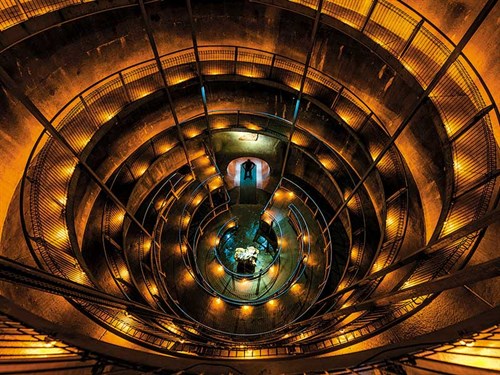
The Glowworm Caves is just one of the three incredible caves waiting to be explored at Waitomo. Aranui Cave is home to New Zealand’s cave weta and apparently has beautiful formations that are a sight to behold. The other is the Ruakuri Cave, which we chose to explore after a coffee and a bite to eat at the Waitomo Caves Cafe.
The Ruakuri Cave—whose name stems from a Maori legend involving the unfortunate demise of two wild dogs (rua meaning two, kuri meaning dog)—was discovered around 400 years ago and takes visitors through an incredible 1.6km of caverns, past underground streams and waterfalls and magnificent rock formations that are simply beautiful.
The caves are accessed by an impressive spiral entrance, which winds its way down from the surface to the subterranean depths, reminiscent of something from Dr Evil’s lair. I’m no geology expert or even an enthusiast, but it was hard not to be impressed by Ruakuri’s formations. And the further you go, the more impressive they become.
Our tour guide told the story of the cave’s intriguing history including why the spiral entranceway was built away from the original entrance, which was used as a burial ground and is considered to be an extremely sacred site.
Many visitors to the cave describe the experience as spiritual and I concur. New Zealand has precious few places that offer such richness of history and a give a real sense of the awe and power that lies hidden beneath terra firma.
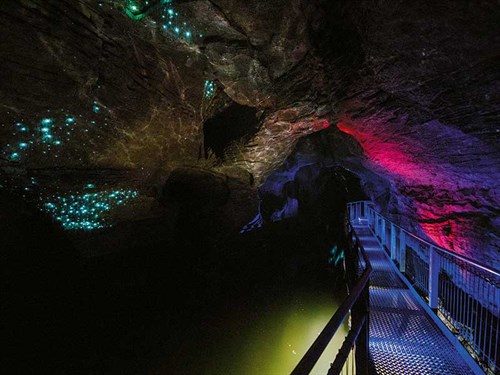
With glowworms aplenty throughout the cave, combined with the abundance of awesome photo backdrops (photos are allowed but only in certain areas), along with the relatively small tour numbers (just 15 on our visit), the Ruakuri Cave was by far my favourite of the two.
The cave is also accessible for wheelchairs and pushchairs and the tour guides do a great job of ensuring every member of the tour comes away feeling richer for the experience.
Tips for Waitomo Caves
Glowworm Caves
- The Glowworm Cave tour takes around 45 minutes with tours leaving every 15 minutes or so.
- Photography is strictly forbidden, as is touching any of the rock formations.
- The tours can get quite busy so plan around non-peak times if possible.
Ruakuri Caves
- The Ruakuri Cave is accessed by a shuttle van from the main Waitomo Cave centre. Buy your ticket at the main window and you’ll be shown where to wait for the shuttle.
- The tour takes around two hours in total.
- Those looking for a little more adventure can give black-water rafting a go. There are three guided black-water rafting options to choose from and each promises a safe but exhilarating ride.
- Photography is allowed in some parts of the cave.

